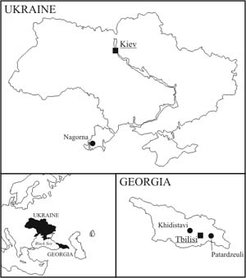Land reform in two former republics of the Soviet Union: Georgia and Ukraine

The Ukrainian information provided below is based on a year's fieldwork carried out over the period (2000-2004). It constitutes part of my ongoing research in a village in the Odessa region. The Georgian information is based on a two week exploratory research trip to Georgia in September 2002. During this time I conducted lengthy interviews with a number of leading figures in the land reform process in Tbilisi. I also twice made day trips to rural areas. As I have conducted no long term fieldwork in Georgia, these findings remain tentative, but are useful in highlighting particularities of the land reform process in Ukraine. Ukraine and Georgia both attained independence in 1991 and initiated land reform during the following year. In Georgia the law transferring land to private ownership was passed in 1996, with registration of titles beginning in 1997. Ukraine followed a similar schedule with legal procedures in place by the mid 1990s although actual conveyance of titles did not begin until 2001. In both countries this process is still underway.
Land Reform in Georgia
The geo-political position of Georgia, lying as is does between the Caspian Sea (the source of oil which is now bought up by western companies) and western Europe, has given the country considerable strategic importance. As a consequence Georgia receives millions of dollars in aid, a fact which has had direct repercussions for land privatisation issues: while the government makes the laws concerning the land, it is NGOs which implement these laws. One USAID official informed me that 'there has been no state budget for land privatisation for the last 3 years because there are so many foreign donors here that there's no need for the state to set aside money for this'.
By the end of 2002 approximately 25% of all land, or 60% of intensively farmed former kolkhoz and sovkhoz land, had been transferred to private ownership. Land is distributed according to criteria of both work and residence. Thus ex-kolkhoz and sovkhoz workers are entitled to a maximum of 1.25 ha of land, village residents working in the non-agricultural sector (eg. teachers) are entitled to 0.75 ha, while citizens not resident in the village but with rural connections are entitled to 0.25 ha. In each case the entitlement figure is higher if the location of the village is in the less fertile mountainous areas. In principle, these criteria of entitlement do not vary significantly from the Ukraine case. But in Georgia a further factor comes into play: land ownership was granted to a household rather than to a family or an individual. This is problematic because 'household' is not defined in Georgian legislation, nor is it legally clear how a person should become or give up membership in a household. Family is defined in the legal code as a couple and their children. Although in most rural cases a family and household are equivalent, this is not necessarily so, and it is possible that in a multi-generational household, the elderly parents might have legally separated, thus constituting a separate household. It is on the basis of local household books in the village that ownership is ultimately determined. If a household consists of a husband, wife and children, they have one land title, even if both adults worked in the previous collectives.
Much of the land is still not transferred into private ownership; meadows and pastures, for example, remain in state ownership. Ltd's were formed from the collectives (often now owned by previous ex-heads) and they are frequently the leasers of the land. While some of the previous facilities remain in their possession, much of the technology has reportedly been stolen or is old. Local committees decide how such common land is used and pro-reformers in Tbilisi point out that this land is often badly managed and at the centre of corruption charges.
